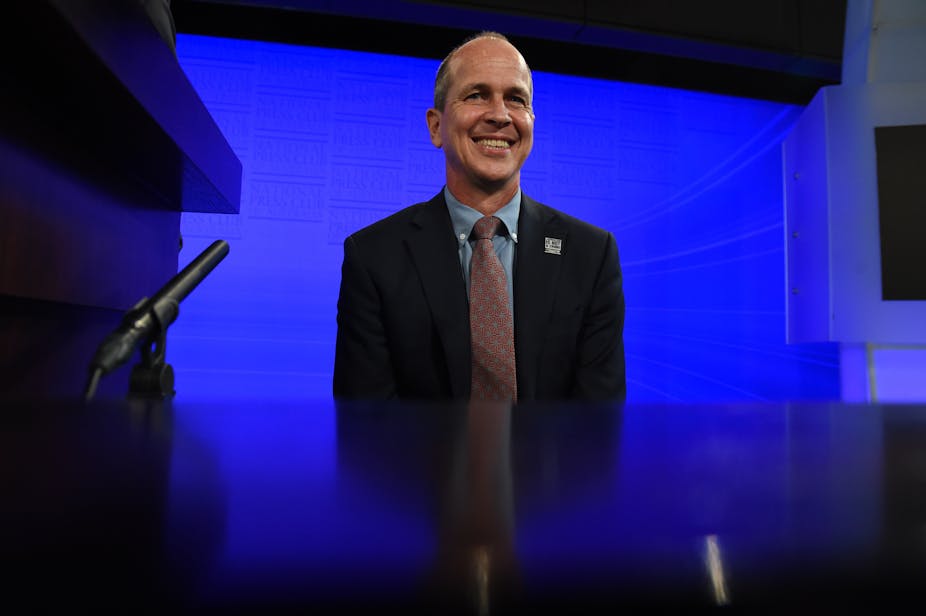Our journalists come in for a lot of stick, what with accusations of political bias from politicians, intrusions on privacy from celebrities, or ‘dumbing down’ of the culture in general. But Peter Greste’s speech at the National Press Club is a moment to celebrate another side of the Fourth Estate’s role: reporting on events that matter to us, providing the information on which we rely as citizens in a democracy.
The importance of that role is built into the DNA of the journalistic profession, but as Greste’s experience shows, performing as ‘the fourth pillar’ of democracy is more than just a slogan: it is, in far too many contexts and countries these days, a matter of life and death. Those who choose to do it are brave beyond what most of us can imagine. They are heroes, who risk their freedom and their lives to bear witness to injustice, conflict and atrocity.
Since 1992, reports the Committee To Protect Journalists, 1121 journalists have been killed while performing their duties around the world. The most dangerous countries to be a journalist include, as one might expect, war zones such as Iraq (166), Syria and Somalia (56). They include countries where the rule of law does not apply, such as Russia (56), Mexico (32) and the Philippines (77). In these locations journalists are less at risk from religious extremists than organized criminal gangs, often sponsored by corrupt elements within the state.
As of 2014, Greste noted in his speech, 220 journalists were held in prisons, many of them in countries regarded as respectable partners of the democratic world such as China.
Journalists have always been vulnerable in conflict zones, of course, ‘collateral damage’ in the destruction taking place around them. In recent times, however, they have come to be perceived as legitimate targets by combatants on all sides. Rather than being seen as detached, objective reporters, they are often perceived as participants and actors in conflict. From the beheading of Daniel Pearl by Al Qaeda in 2002 to that of James Foley by ISIS in 2014, journalists have been treated as agents of one side or another. As Greste said, warring sides in the Middle East and elsewhere increasingly attack the messenger and not the message.
Al Jazeera, for example, Greste’s employer when he was jailed for ‘terrorism’ offences, is regarded with deep suspicion by the Egyptian government (and others in the Middle East) as a Qatari-funded and controlled cheerleader for Sunni extremist organisations such as the Muslim Brotherhood. While Hosni Mubarak was being driven out of power in 2011, Al Jazeera was being harassed by security forces on the ground in Cairo. Working for Al Jazeera in Egypt, two years later and after the violent suppression of the Muslim Brotherhood, Peter Greste inevitably risked being sucked into a conflict that no one doubts he was trying to report to the best of his professional ability.
And while we rightly criticize the Egyptian approach to Al Jazeera, let’s recall that the organisation’s Baghdad bureau was bombed and its journalists killed and wounded by US forces during the invasion of Iraq in 2003.
In his most controversial remarks, Greste blamed George W. Bush and the ‘war on terror’ for this disturbing tendency to target the media, or, as he put it, to make the media ‘the battleground’. By declaring that ‘you are either with us or with the terrorists’, suggested Greste, Bush made it easy for such as Al Qaeda and ISIS to treat journalists from countries deemed to be allies of the US as combatants.
Turning to the bigger picture, Greste noted Freedom House estimates that only 14 per cent of the world’s population live in countries with a completely free press, and called for a global reassertion of the ‘universal principles of freedom of expression and the public’s right to know’. These were under attack, he said, even in Australia where politicians and governments, both Labor and Coalition, cite national security and the demands of the local war on terror as grounds for increasing restrictions on the freedom of the media, such as the proposed legislation on metadata.
The debate on the legitimate uses of metadata by government and security agencies continues, and while it may be unwise to exaggerate its significance in a world where our personal data is held and used by all kinds of organisations, commercial and public, one can readily understand why Greste would wish to adopt the precautionary principle on any law which in the view of many threatens to restrict journalists from going about their Fourth Estate business.
He ended his talk with a call for Australians to support the idea of a Universal Media Freedom Charter, and to join a conversation about how to draft such a document. We should take him up on that, not least as a salute to his courage, and that of all the journalists who have suffered in pursuit of their craft.

